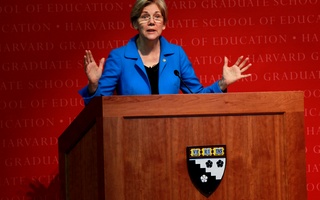NEW YORK--The Democratic party decisively moved toward the political center at its convention this week, troubling some of the party faithful.
Most leaders said the party has not abandoned its principles, and that the shifts were designed to put a Democratic president in the White House.
Still, there were rumbling of discontent this week from more liberal members of the party. Some suggested that they would have to hold their noses while voting for the Democratic nominee, Arkansas Gov. Bill Clinton.
"The Democratic Party is in a near-terminal condition. Absent any alternatives, however, I shall support Clinton," wrote Norman Birnbaum, an editorial board member of The Nation, in that magazine's convention issue.
Another Nation editorial board member, Neil Postman, wrote that he intends to vote for Clinton, "as much in shame as in sorrow."
Some liberal politicians tucked away in non-prominent corners of the convention program had similar messages.
The Rev. Jesse L. Jackson said Tuesday night that the Democrats should take care not to abandon the moral center in their search for the political center.
And former California Gov. Edmund G. Brown Jr., who still has not endorsed Clinton, said Wednesday that Democrats should "save our souls, return to our roots."
Brown's delegates are among the most troubled by the party's shift away from traditional liberalism.
Glenda Savage, a Brown delegate from East Palo Alto, Calif., said Wednesday that the party had moved "too far to the right."
"It's going to be really hard for me to support Bill Clinton in November," Savage said.
There are genuine ideological rifts here. Clinton's refusal to accept Brown's "Humility Agenda" (a series of campaign reforms) shows that the nominee does not share Brown's belief that the gridlock in Washington is primarily due to the unchecked influence of power and money.
Jackson has considerable differences with Clinton on national health care. Clinton supports a plan where employers contribute health care funding; Jackson supports a government-funded "single payer" plan.
Brown and others are disappointed that the party platform adopted Tuesday does not include the words "labor union."
And many worry that, with all the attention being paid to "the forgotten middle class," Clinton and the Democrats have themselves forgotten the poor.
It remains to be seen how this conflict over party principles will play out in Cambridge and at Harvard University, traditionally among the most liberal enclaves in the United States. However, given strong local support for both Clinton and his fellow centrist former Massachusetts Sen. Paul E. Tsongas during last spring's primaries, it appears likely that many local voters will rally around the nominee.
Read more in News
Leader of Lobby for Space Urges Increase in U.S. FundsRecommended Articles
-
Running on EmptyThe bizarre coincidence of the breaking of the Monica Lewinsky sex scandal and the crisis in Iraq as the movie
-
Broken Brokered DreamsJ ERRY BROWN isn't the only one who has lost faith in the system. Three days after the New York
-
Students Endorse ClintonThe Harvard-Radcliffe college Democrats jumped on the bandwagon this week and joined several other organizations in endorsing Arkansas Gov. Bill
-
Clinton's ConventionBOSTON, Wednesday, July 28—Some Democratic officials worried that the party would have a hard time staying on message this week.
-
 After Long Wait, Elizabeth Warren Endorses Clinton
After Long Wait, Elizabeth Warren Endorses Clinton













